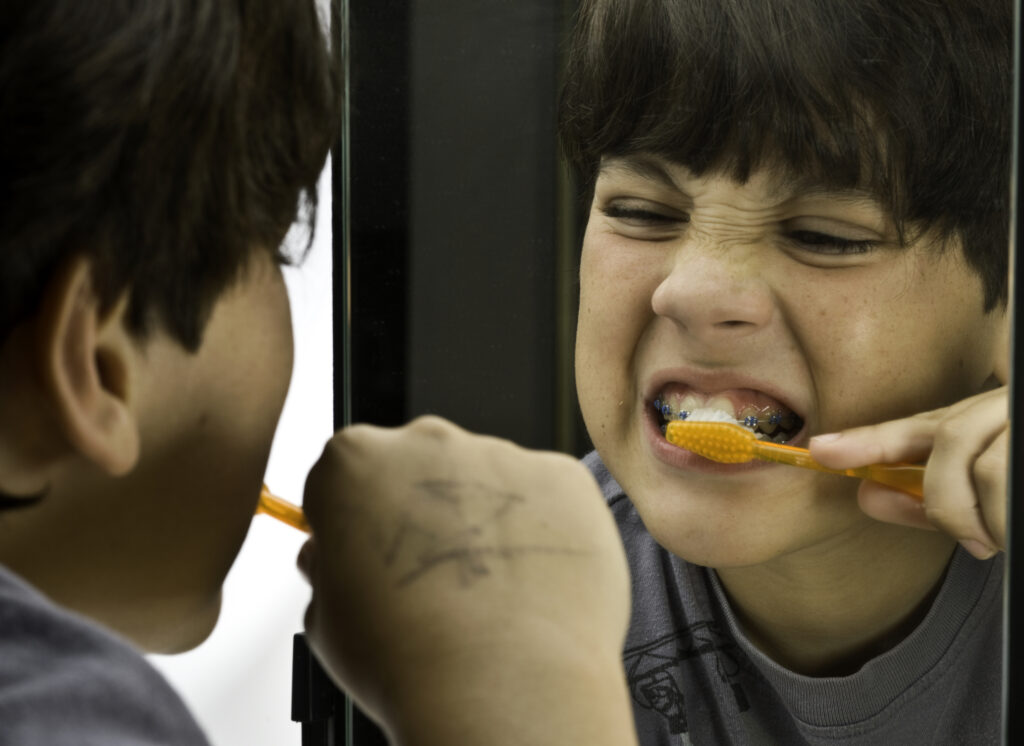Four Tips Towards Enjoying a Great Looking Smile

As patients of Dr. McGinty know, a healthy smile requires brushing twice a day, scheduling regular visits at our Denver biological dentist office and cutting back on the amount of sugar you consume daily. If you’re one of the many patients who takes good care of their oral health only to discover you need a cavity filled during a dental visit, you may be wondering what’s going on?
While the steps listed above remain the best ways of limiting the effects of tooth decay and preventing the development of gum disease, enjoying the best oral health possible requires just a little bit more. Here’s what you need to know before your next visit to our Denver biological dentist office.
Improve Those Brushing Skills
Brushing is important, but brushing using the correct technique offers the protection needed to prevent tooth decay and gum disease. Brushing using the proper mechanics effectively removes dental plaque – a sticky mixture of oral bacteria and food particles that remain in the mouth after eating – from the surface of your teeth.
Plaque forms naturally on our teeth and uses the foods we consume to produce harmful acids that slowly erode away the enamel protecting the interior of our teeth. Fortunately, it takes time for plaque to damage our teeth, so by brushing – and flossing – regularly we can help prevent any damage from being done.
While you can watch videos on YouTube or ask Dr. McGinty to demonstrate how to properly brush during your next visit to our Denver biological dentist office, the one thing you can immediately improve on is how long you take to brush.
The American Dental Association recommends spending at least two minutes brushing twice a day. However, despite this recommendation, people only spend an average of 30 seconds brushing a day, according to the ADA. Imagine the results if you only spend 30 seconds shaving, applying makeup or even showering.
Enjoying the best oral health possible means taking the time to properly brush each day.
Take the Time to Floss
We’ve already covered the importance of brushing, but flossing also plays a vital role in protecting the long-term health of our teeth and gums.
Flossing works to remove plaque and food particles that remain in the mouth after eating from areas of your mouth a toothbrush cannot reach – between your teeth and below the gum line. If you don’t think that cleaning these areas are important, consider that the most common place for cavities to develop is actually between our teeth.
Despite the role flossing plays in helping to protect our oral health, the habit has come under some recent scrutiny. The Associated Press published a report in 2017 that found flossing providing no noticeable improvement on an individual’s oral health. For many people that aren’t fans of the floss, this report provided the perfect excuse to stop practicing the habit altogether.
However, many oral health professionals pushed back on the AP’s report, stating that flossing should still remain part of an individual’s daily oral hygiene routine. Dentists recommend patients continue to floss because at the very least the habit can only benefit your oral health, even if the results aren’t immediately noticeable.
Brush Twice a Day
At night while you sleep, the body produces far less saliva than during the day. Because of less saliva, your teeth have less protection to the effects of harmful oral bacteria and the acids they produce that weaken tooth enamel. Because your teeth become more vulnerable during sleep, it’s important to remove food from your teeth before heading off to bed so plaque can’t damage your teeth during the night.
Less saliva flow also means that more plaque will buildup on the surface of your teeth overnight. Since you start the day with mouthful of plaque, you also need to brush in the morning to remove this excess buildup of bacteria.
And in case you’re wondering, it’s usually better to brush after eating breakfast whenever possible.
Cut Back on Added Sugar Consumption
Sugars are found naturally in many of the healthy foods, like fruit, we eat every day. These type of natural sugars are far less likely to lead to the development of tooth decay when comparted to the sugar added to such favorites as soda, candy and sports drinks.
Maintaining a healthy smile meaning eating a balanced diet. Cutting back on artificial sugars in favor of more fresh fruits, vegetables and whole grains will not only make your smile healthier, it will also have a noticeable impact on your overall health as well.
